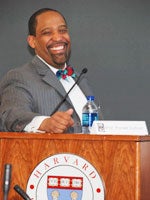When Hurricane Katrina hit New Orleans in August of 2005, the criminal justice infrastructure was among the many casualties; courtrooms were destroyed, personnel scattered and prisoners evacuated all over the state and beyond. But it brought attention to a system that was already so badly in need of repair it routinely violated constitutional norms. In March, the Black Law Students Association spring conference brought together a panel of lawyers and public officials who weathered the storm to discuss attempts to rebuild the system from the ground up.
Derek Honore ’93, a public defender in New Orleans from 2000 to 2007, recalls the chaos after Katrina when he represented prisoners evacuated to a maximum security prison in rural Louisiana: “You’d show up at Hunt Correctional Facility and have 50 or 60 inmates you were dealing with at a time. None of us would go in knowing anything. You had limited time to speak to the clients themselves. Even getting someone bailed out of jail—if they had someone to put up the money—was difficult.” Honore estimates he saw at least 1,000 clients in this way over a couple of months. By then the public defender’s organization, which relied on court fees and parking fines, was nearly out of money and forced to layoff most of its attorneys. “But even before Katrina,” said Honore, “we were seriously overburdened. It was always a heartache.”
Pamela Metzger’s description of the New Orleans public defender system was even stronger: “a grotesque, profoundly un-American situation. … in defiance of every known constitutional principle.” A professor at Tulane Law School and director of the school’s criminal law clinic, in the aftermath of Katrina, Metzger was appointed, along with Stephen Singer ’88 of Loyola Law School’s clinic, to represent thousands of defendants then being held without representation. “We had 8,000 people in jail without anyone being responsible for advocating on their behalf,” she recalled. The only person who even knew where they all were, she said, was the Orleans Parish criminal sheriff, Marlin N. Gusman (who also participated in the panel).
In addition to representing clients, Metzger launched impact litigation across the state. One suit on behalf of 25 prisoners—whom she claimed had been incarcerated in defiance of the state constitution—drew on a state habeas corpus statute. Ten of the inmates should already have been out of prison, she said, because they had made bail, because charges had been dismissed, or because they had served the maximum sentence (although they had never been found guilty). Within 72 hours, half of them were released.
In another suit, she challenged the funding structure for the court, making the case that it was unconstitutional to assess public defender fees on public defender clients. Another panel participant, Arthur Hunter, now chief judge of the Criminal District Court in New Orleans, heard that case and found the system to be unconstitutional. And in May of 2006, he suspended all prosecutions in cases involving public defenders, because he believed representation had become inadequate.
Soon afterwards, Ronald Sullivan ’93—who moderated the panel and is now clinical professor of law and director of the Harvard Criminal Justice Institute—was hired to reform the system. Previously, judges hired the board that hired the defenders. “Basically, the public defenders, prior to Katrina, were more in tune with the interests of the judges, than with representing their clients,” said Hunter. A new board was formed independent of the judiciary, which brought in Sullivan. The changes he implemented ranged from giving public defenders telephones and access to computers, to paying them a higher wage, and requiring them to work full-time. In the past, they had been part-time employees, who earned their living handling private cases, and Sullivan said this meant there was a built-in incentive for defenders to maximize their private practice and do as little as possible in public practice. When it came to the reforms, there was “a predictable resistance from the prosecutors and judges,” he said,“but also from the defense bar.”
Honore, the former New Orleans public defender, said he was happy with the changes, which made it much easier to represent clients, but he knew that a lot of defenders focused on the pay cut and expanded duties. “In the old days, a lawyer would only see his client when he showed up in the courtroom to see if the charges were accepted.”
“Believe me, if I had the power I’d have taken Katrina away,” said Honore. “But since it came and shone a light on this, a lot of positive steps are being made.”
Sullivan’s panel, “The Levees Repaired, A System Still Broken: Addressing Post-Katrina Criminal Justice From the Ground Up,” was one of six panels held during the Harvard Black Law Students Association’s Spring Conference, titled “The Fierce Urgency of Now.” The three-day event, held March 13-15, included panels and presentations on effecting change at home and across the globe.
Keynote addresses were given by City of New Orleans Mayor Ray Nagin; Author and Political Strategist Donna Brazile, Congressman Donald M. Payne (D-NJ); and Ruth Ellen Fitch ’83, president and CEO at Dimock Community Health Center, (see Harvard Law Bulletin profile).
Conference panel discussions focused on local issues, “Establishing Health Equity for Black Bostonians,” and national issues, “My President is Black: Obama’s Road to the White House and the Road Ahead,” moderated by Stephanie Robinson ’94, president and CEO of The Jamestown Project.
A later panel, “Unbundling Darfur: Debating Facts and Policy Responses to an International Crisis,” included panelists Olaru Otunnu LL.M.’78, president of LBL Foundation for Children, a New York-based independent international organization, and Omer Ismail, a native of the Darfur region of Sudan and a policy fellow at the Kennedy School of Government in the Carr Centre for Human Rights Policy.
Darrell Bennett, Jr. ’10, author of “Daring to be Different: 25 Tips for a Life of Success, also moderated a panel on “Diversity in the Legal Profession,” with representatives from several law firms, including Milbank, Cravath, Debevoise and Jones Day.
